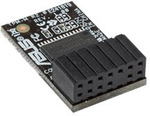I just finished building my first desktop PC and wanted to enable Bitlocker but realised I needed a Trusted Platform Module (TPM) to be plugged into my motherboard otherwise Windows wouldn't be happy (it's still possible without it but requires a registry override which indicates Microsoft's default position is not something to be taken too lightly). Regardless of the debate over whether to use AMD fTPM (the inbuilt firmware TPM) or whether encryption is even necessary on a desktop PC, I still wanted to encrypt my drives with Bitlocker in Windows 10 Pro.
Cheapest TPM I could find was this one at JW for $5. These seem to be universal to fit into the 14 pin hole on many motherboards. Looking online, they start at circa $20 and are mostly located overseas from what I could tell.
Delivery isn't cheap for something so small ($11 for me in Sydney) but there's free pick up in store. To avoid the credit card charges, you can even use Zip Pay which doesn't appear to charge any fees as long as you meet the repayment schedule.




According to bloomberg all chips not from USA cannot be “trusted” even apple and amazon say so……..bad joke waiting for negative….